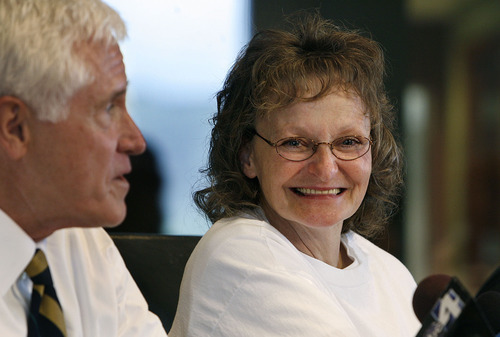This is an archived article that was published on sltrib.com in 2011, and information in the article may be outdated. It is provided only for personal research purposes and may not be reprinted.
Utah Attorney General Mark Shurtleff has flip-flopped on a decision not to appeal a Logan woman's exoneration in a 1993 slaying, officials at the Rocky Mountain Innocence Center (RMIC) said Wednesday night.
The decision comes more than two weeks after 53-year-old Debra Brown was released from prison after being found "factually innocent" in her employer's shooting death by a 2nd District Court judge.
"RMIC believes the attorney general's decision is incredibly irresponsible to taxpayers and cruel to Debra Brown and her family and supporters," the innocence center said in a statement. "After being promised that the state would not appeal, Ms. Brown and her family were beginning to put their long ordeal behind them and to heal. Ms. Brown was looking forward to what she described lovingly as her 'new, improved, restored life.' The attorney general's change of mind has left her and her family 'broken-hearted.' "
"It's certainly disheartening for the family," said Debra Brown's brother, David Scott.
Scott said the family has faith that Brown's attorney, Alan Sullivan, will resolve the matter.
On Wednesday, the Attorney General's Office said it planned to hold a news conference Thursday to "discuss [the] new factual-innocence law."
Brown was cleared under a 2008 statute that allows an inmate to seek a hearing to prove her innocence, even when no new DNA evidence exists.
Assistant Attorney General Scott Reed told The Salt Lake Tribune that the case could set a dangerous precedent for the state's legal system.
The Attorney General's Office, however, will not ask that Brown be returned to prison, where she spent nearly 17 years, even if the appeal is successful.
"It's not fair to her, at this point," Reed said. "The conviction on the books is what's important. Where she resides for the rest of her life is of little consequence to us."
Brown's case was the first to receive a hearing under the new law.
"This is a pretty powerful tool, and any powerful tool is subject to abuse," Reed said.
Earlier this month, Shurtleff said he wouldn't appeal and believed such cases would be "rare" in Utah.
Prior to Brown's release May 9, the AG's Office filed an intent to appeal Judge Michael DiReda's decision but said it wouldn't appeal the case after Shurtleff made an informal announcement saying as much on Twitter.
Later that day, Shurtleff said in a formal statement: "In the interest of justice and mercy, the time has come to bring closure to Debra Brown and everyone involved in this case. She has served 17 years in prison, and a judge has found her factually innocent. This was Utah's first case like this, and I am convinced these types of challenges will be rare. Our office will vigilantly fight to make sure the justice system punishes the guilty and protects the innocent."
Reed said the state would file its appeal Thursday.
"In the course of 30 days, any good lawyer goes back and forth and flip-flops several times," Reed said, adding that "an isolated sliver of that conversation fell out into public view."
DiReda found that Brown couldn't have killed her friend and employer, Lael Brown, who is no relation, at his Logan home in 1993. At the 1995 trial, prosecutors focused on a time frame for which Debra Brown didn't have a corroborated alibi, but at a new hearing this year, witnesses testified to seeing Lael Brown alive after that time.
Witness Delwin Hall reported the sighting to police in 1993, according to court documents. Hall was on the defense's witness list at trial but wasn't called to testify.
"The problem, legally, is that it's not new [evidence]," Reed said of Hall's testimony.
Reed and others at the AG's Office also remain convinced that Debra Brown is guilty. Prosecutors said they have a duty to fight to uphold the conviction.
"If we do not appeal this case, they [Lael Brown's family] will never, never know who killed Lael Brown," Reed said.
The Rocky Mountain Innocence Center said it sought to discuss the appeal with the attorney general, but its requests were ignored.



